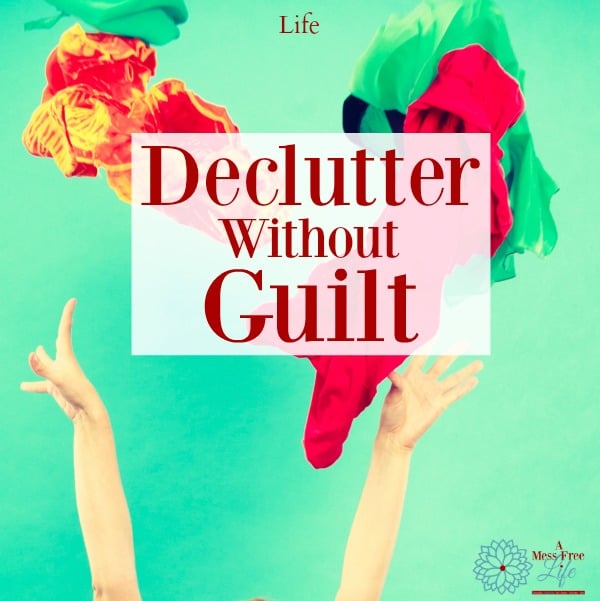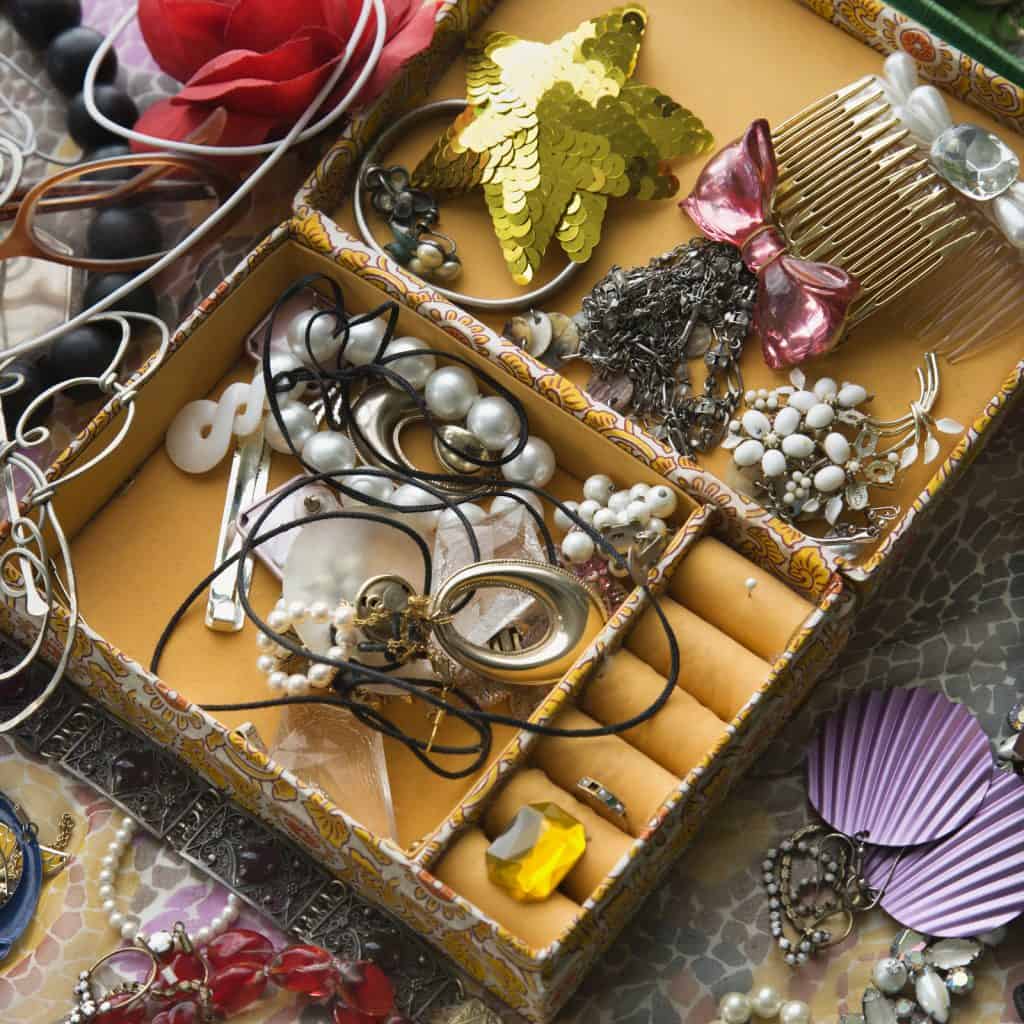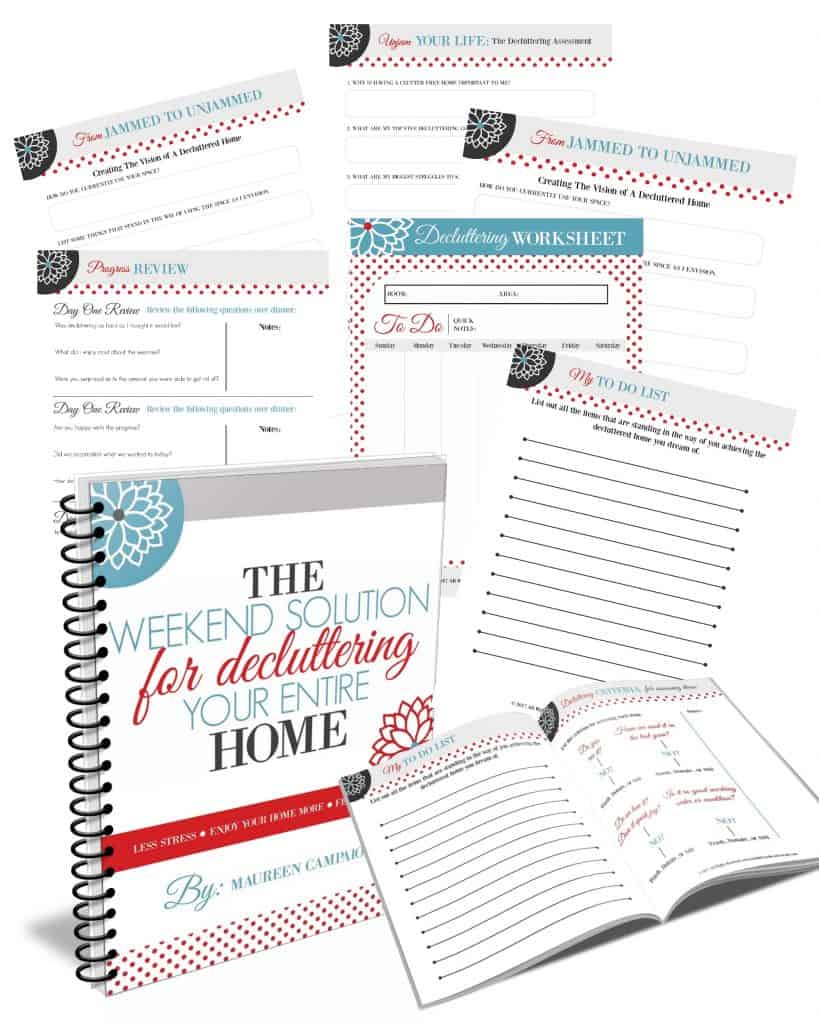A Mess Free Life may collect a share of sales or other compensation from the links on this page.
Maybe you’ve been giving some thought to decluttering some of those overloaded areas of your home, but you’re afraid your decluttering project will leave you with feelings of guilt.
The garage, the attic, bookcases, basements, and unused rooms are all excellent storage spots, but you rarely use anything in there. And wouldn’t it be nice to actually put your car in the garage?
I grew up in a household that was stuffed to the brim.
We had an attic full of items my mother refused to part with.
The held items that were handed down from my grandmother. There were some treasures, but because of the years of sitting in wet, damp basement, their value became worthless due to mold and mildew damage.
We never had room to park our car in the garage.
The house was another story. It was filled with current things my mother would bring home from her weekly shopping excursions to the mall, thrift stores and the like.
We were drowning in stuff, and it was holding us back.
Maybe you can relate? Did you grow up like this or find that your home is currently filled with items that just don’t see to have a purpose?
Table of Contents
ARE YOU READY TO DECLUTTER WITHOUT FEELING GUILTY?
Feng Shui experts will tell you that clutter is blocking other areas of your life. Clutter may be blocking the flow of your home and the energy you and your family create there, causing you to feel tired, stressed, and even depressed.
Many experts will even tell you that clutter is blocking your flow of money.
When it comes to your attic, Feng Shui tells us that your clutter is literally “hanging over your head;” out of sight but not out of mind.
If cleaning up and decluttering can improve your energy, reduce stress, and perhaps even your flow of money, shouldn’t it be worth it?
Yes. But . . . There are a number of reasons why you may still be holding on. Watch this short video and learn about the high cost of clutter:
Now that you have an even better understanding of what clutter is costing you let’s get down to how best to part with the things that are holding you back!
START WITH JUST ONE AREA
Pick a room or a space that you feel comfortable starting with. Maybe it’s the garage. Chances are if you’ve been using it as a storage room for the past several years, it’s going to take more than a day to get it all cleaned out. That’s okay.
Mentally divide the space into three or four smaller sections and start with just one. Often, when you slowly initiate the process, it’s easier to move forward than coming in and throwing it all out at once.
IT WILL BE LIKE THROWING MONEY AWAY
If you spent money on something you never used (clothes, shoes, games, kitchen gadgets), it might be hard to get rid of it. Sometimes this guilt shows up in two ways. First, you feel guilty you wasted the cash, and you feel just wasteful in general.
But the money is already gone! It’s already been spent! You’ve already thrown it away on something that’s just taking up space. Let it go.
Letting it go is better for you than continuing to look at it and be reminded of the guilt. Once you part with it, you’re parting with the guilt too.
IT STILL WORKS
If it’s still in good condition, it’s not doing you or anyone else any good by just sitting in a box. Donate it. Give it to a friend. Sell it online or at a yard sale. Let someone else put it to good use.
This helps to assuage your guilt because you can focus your attention on the fact someone is getting use it, and that’s a good thing!
IT WAS A GIFT
People give gifts to make the receiver feel good. If you’re truly not enjoying the gift, it’s okay to let it go. Regift it to someone who would enjoy it or donate it. Trust me; most people are not coming to your home and searching to see if you’re using the gift they gave you.
I MIGHT REGRET IT
The “just in case” mentality is causing you to hold on to things you don’t need. It’s a waste of space and money to keep holding onto them. If you’re not sure about something, put it in a box and set it aside for a few months. If at the end of that time, you haven’t taken it out even once, it’s time to let it go.
The trick here is to give yourself the time you need to truly see if you need the item. Now, you can’t do that with all the clutter, but for really big items or sentimental items give yourself the time you need.
IT HOLDS TOO MANY MEMORIES
If we held on to everything that had sentimental value, we’d all need much bigger houses. Instead, hang on to a few small items and trinkets in a memory box. You can even include photos of larger items before you get rid of them. Display your memory box and let go of everything else. It’s not serving you any purpose just taking up space.
I know for many of us whose parents have died this is one of the hardest things to do. It was for me when my mother passed away.
Be gentle with yourself and give yourself time. If you’ve got a house full of clutter, make the sentimental things the LAST thing you’ll go through not the first, or it will probably derail all the rest of your efforts.
DECIDE WHAT NEEDS TO GO
Go through each item in the area you’re working on and ask yourself three questions. Do I really use this or will I have a use for it in the near future? Does it still work; is it in good condition? Do I like it and want to keep it?
This one’s tricky because you probably like almost everything, that’s why you’ve held onto it. Be hard on yourself with this question; don’t let it be the only deciding factor in keeping something.
If the answer to these questions is “no,” it’s time to let it go.
Another way to ask this question is to use the Kon Mari question of “Does this bring me joy?” You should only keep those items that make your heart sing – because why else own it?
SEPARATE AS YOU GO
As you go through every item, separate as you go. Create four piles: keep, toss, sell, and donate. If something is in good condition but it has to go, donate it or sell it online or at a yard sale. If it’s broken, torn, or no longer works properly, throw it away. If you think you’ll use it and have a plan for how to use it, keep it but move it to its new home, the place you’ll be using it.
We have some great decluttering worksheets and printables that can help you keep this organized, so you know what you’re tossing, keeping, donating or selling.
BE PATIENT
It’s taken you a long time to collect all of these things. You won’t be able to get rid of them all in just one afternoon. And emotionally, it may be difficult to get rid of it all at once. That’s okay. Just go through your space a little at a time and start to make progress. As you do, you’ll start to feel a bit more confident about the work you’re doing.
If on the other hand, you’re at the point where you just want it gone NOW – consider using our Weekend Solution To Decluttering Your Entire Home Program. You’ll be amazed how the program can get your entire home decluttered in just three short days.
REWARD YOURSELF
It’s both physically and mentally exhausting to remove the clutter from your life.
Celebrate your accomplishments! Plan a spa day at home with a bubble bath, a glass of wine, and a good book. Or treat yourself to dinner out or maybe a date night.
If you’re selling items online or at a yard sale, make a plan for how you’ll spend that money. Maybe lunch with a friend or a date night with your sweetie. If you reward yourself as you go, it will be much easier to keep moving forward.
CONCLUSION
Decluttering is not easy, but if taken a little at a time, you can start to move past the guilt and get on to finally getting organized. And maybe even make a little money on the side.
Decluttering can be an emotionally difficult chore to handle, but with a plan, some patience, and a little willpower you can get through it. And when you do, you’ll be glad you did!



